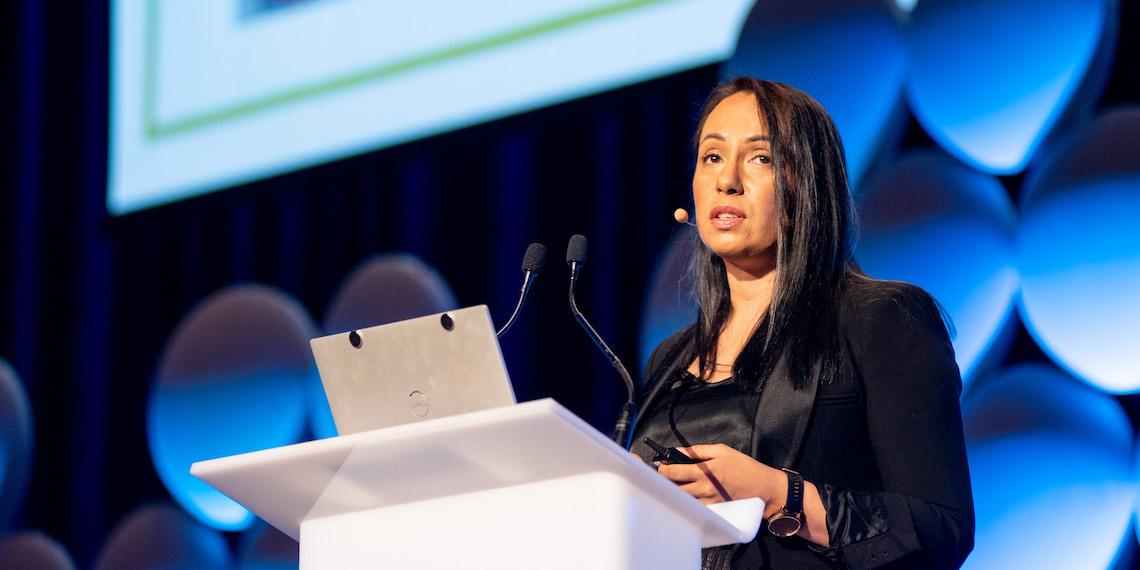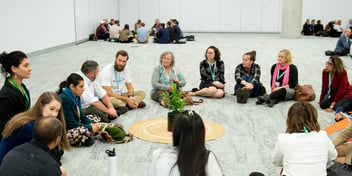Embracing cultural intelligence key to First Nations collaboration

“Full disclosure: I will make you uncomfortable today,” promised Cara Peek, the lawyer, entrepreneurial leader and Yawuru/Bunuba woman who opened Day Two of Ozwater’23 with a keynote address.
“If you truly believe we are united by water – that despite our egos’ best efforts, clean water is not a privilege for the few but in fact a fundamental human right for all – then you may need to check your bias and remove yourself from the centre of the conversation,” she said.
It was a bold challenge designed to take Ozwater’23 delegates out of their comfort zone, and Peek asked attendees to consider issues of cultural bias, community engagement and genuinely confronting disparities in water access for First Nations peoples.
“To create meaningful positive impact, you will need to unpack your current mindsets, commit to building your cultural intelligence and recognise, reflect and rewire your brains to understand the biases that exist and how to break through to best serve First Australian communities through the work that you do,” she said.
“Building your cultural intelligence will enable you to understand what influences the way you view the world – then how this impacts the decisions you make, and therefore how you impact First Peoples.”
More than good intentions
Understanding the First Nations cultures the water industry works with requires more than words and good intentions and a Reconciliation Action Plan, Peek said.
“Increasing your cultural intelligence and understanding of culture will help you with stakeholder engagement, procurement processes, project design and ultimately developing opportunities with rural and remote Australian communities,” she said.
“It requires two-way trust and understanding. This is particularly so, when the only people guaranteed to suffer a material loss as part of any water infrastructure project, or infrastructure generally, are First Peoples – Indigenous peoples, the custodians and Traditional Owners of the land on which the infrastructure is being developed.”
This guaranteed loss facing Indigenous communities who must deal with projects developed on their land showcases why First Peoples must be understood to be more than just another stakeholder.
“I encourage you to check your cultural bias – whether it be at an individual, organisational or corporate level – and consider flipping the script and engaging with our communities at not the finish but at the start. Create place-based, people-centred solutions,” Peek said.
“Elevate to assessing your impact against five pillars: environment, social, Indigenous, economic, and governance. Consider the guaranteed material loss and whatever is required to mitigate it as best as possible.
“As everyone knows, if something is not measured, it doesn't often happen. Adding Indigenous to the bottom line would be a game changer. A guaranteed material loss, warrants an elevation and separation from the other impact categories: an application of a culturally intelligent lens.”
The “speed of trust”
Asking the water sector to move at “the speed of trust” – and not at a speed dictated by project deadlines – Peek urged delegates to engage Indigenous communities with honesty, integrity and transparency.
“It's not about going in, pretending to listen and then doing what you want anyway. That is a colossal waste of time – everyone's time,” she said.
“We may have been around since time immemorial, but we also have the shortest life expectancy in this country. We don't have time to waste. This is especially so for our communities that don't have access to clean drinking water.”
For people at every level of water management, checking one’s ego and unpacking this cultural bias is critical, Peek said. And she offered a way forward, as well.
“Two key ways to develop opportunities with rural and remote communities for the advancement of First Peoples include raising your cultural intelligence as individuals and organisations, and applying that culturally intelligent lens to your procurement, employment and stakeholder engagement,” she said.
“Water is essential to Indigenous culture and sovereignty for spiritual, cultural and – the often dismissed – economic reasons. Indigenous water rights are legal, political and cultural in nature. We've been practicing sustainable water use for millennia.”



